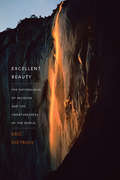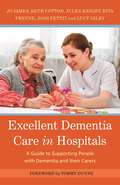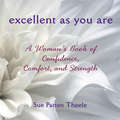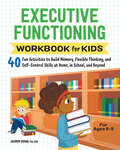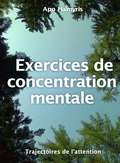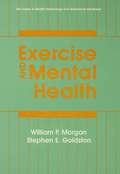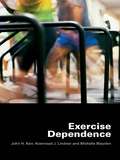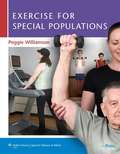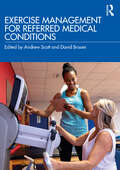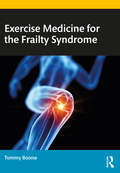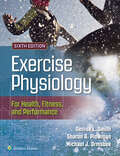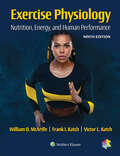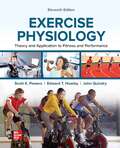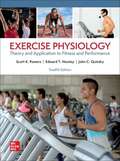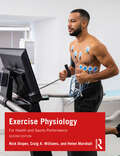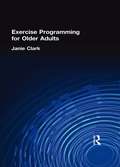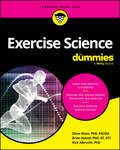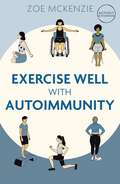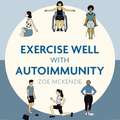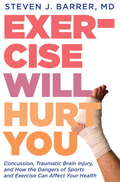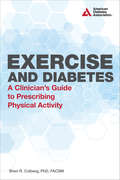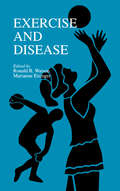- Table View
- List View
Excellent Beauty
by Eric DietrichFlipping convention on its head, Eric Dietrich argues that science uncovers awe-inspiring, enduring mysteries, while religion, regarded as the source for such mysteries, is a biological phenomenon. Just like spoken language, Dietrich shows that religion is an evolutionary adaptation. Science is the source of perplexing yet beautiful mysteries, however natural the search for answers may be to human existence. Excellent Beauty undoes our misconception of scientific inquiry as an executioner of beauty, making the case that science has won the battle with religion so thoroughly it can now explain why religion persists. The book also draws deep lessons for human flourishing from the very existence of scientific mysteries. It is these latter wonderful, completely public truths that constitute some strangeness in the proportion and reveal a universe worthy of awe and wonder.
Excellent Beauty: The Naturalness of Religion and the Unnaturalness of the World
by Eric DietrichFlipping convention on its head, Eric Dietrich argues that science uncovers awe-inspiring, enduring mysteries, while religion, regarded as the source for such mysteries, is a biological phenomenon. Just like spoken language, Dietrich shows that religion is an evolutionary adaptation. Science is the source of perplexing yet beautiful mysteries, however natural the search for answers may be to human existence.Excellent Beauty undoes our misconception of scientific inquiry as an executioner of beauty, making the case that science has won the battle with religion so thoroughly it can now explain why religion persists. The book also draws deep lessons for human flourishing from the very existence of scientific mysteries. It is these latter wonderful, completely public truths that constitute some strangeness in the proportion, revealing a universe worthy of awe and wonder.
Excellent Dementia Care in Hospitals: A Guide to Supporting People with Dementia and their Carers
by Tommy Dunne Bethany Cotton Jo James Josh Pettit Jules Knight Julia Jones Lucy Gilby Nicci Gerard Rita FreynePeople with dementia increasingly find themselves staying in hospitals for extended periods, and dementia is often only diagnosed on admission to hospital for a separate health issue. This practical guide presents healthcare staff with the information and tools needed to provide excellent person-centred care to people with dementia in hospital settings. This best-practice handbook includes information and innovative strategies on how to manage common issues, including communication, physical health needs, pain, eating and nutrition, working with carers and relatives, understanding behaviour and approaching the end of life. It also highlights ethical considerations such as human rights and dementia, making decisions and the Mental Capacity Act. Each chapter includes a case study, emphasising the person at the centre of care and providing worked examples of how hospital staff can work with people with dementia to ensure best practice.
Excellent as You Are: A Woman's Book of Confidence, Comfort, and Strength
by Sue Patton Thoele“A series of elegant and encouraging essays designed to spur female self-esteem” from the bestselling author of The Woman’s Book of Spirit (Spirituality & Practice).Sue Patton Thoele offers us food for thought, insightful stories, motivational quotes, and lush photographs, giving us the inspiration we need to find our own sources of strength, courage, and comfort.We all look for comfort and positive affirmations from outside sources, but what if you knew how to tap into your true inner self to find that lasting confidence? Author Sue Patton Thoele offers insightful stories and quotes from her bestselling meditation book, The Woman’s Book of Confidence. Thoele reminds you that confidence and strength come from within us, and inspiration is all around you, even if you can’t see it at first.We all find it hard to reflect and stay focused at times. Sue Patton Thoele has just the solution. Filled with lush pictures of nature and greenery, Excellent As You Are helps you stay grounded in your thoughts and teaches you that lasting confidence comes from within.In Excellent As You Are, you can learn more about:How to find courage within yourselfHow to stay calm in times of stressHow to be the most confident version of yourself
Executive Functioning Workbook for Kids: 40 Fun Activities to Build Memory, Flexible Thinking, and Self-Control Skills at Home, in School, and Beyond (Health and Wellness Workbooks for Kids)
by Dr. Sharon Grand PhD, BCNHelp kids grow their executive functioning skills with activities for ages 6 to 9 Executive functioning is the name for the skills we use to pay attention, complete tasks, and remember important things. But that's a lot for a brain to do every day—especially for kids. The Executive Functioning Workbook for Kids helps them train their brain to improve their memory, flexible thinking, and self-control. Kids will explore 40 hands-on activities to help them conquer executive functioning skills at home, at school, and out in the world.Just for kids—This book is made especially for kids to work on independently so they can see their skills develop and feel accomplished.Insightful activities—Kids will discover exercises that inspire them to work hard and appreciate the strengths and talents they already have.Tools for parents—Grown-ups can get involved, too, with a section of tips and activities that explain how kids learn and how adults can help them succeed.Empower kids to tackle any challenge with the skills they'll learn in the Executive Functioning Workbook for Kids.
Exercices de concentration mentale: Trajectoires de l'attention
by Apo HalmyrisUne approche pratique des techniques de concentration. L'auteur de "Méditation et Créativité" nous offre ici une nouvelle série de leçons sur les techniques de concentration. Cet ouvrage s'adresse à nos contemporains en recherche, en conservant les concepts classiques validés par l'expérience.
Exercise And Mental Health (Series in Health Psychology and Behavioral Medicine)
by William P. Morgan Stephen E. GoldstonPublished in the year 1987, Exercise and Mental Health is a valuable contribution to the field of Counseling and School Pscyhology.
Exercise Dependence
by John H. Kerr Michelle Blaydon Koenraad J. LindnerExercise dependence or addiction has been described as a 'positive addiction', but it can have links with damaging dysfunctional and excessive behaviours, including eating disorders. Clinical and sport psychologists now acknowledge the condition and report that it can be found in recreational exercisers and competitive athletes. This is the first text to provide a comprehensive guide to exercise dependence. The text contains case studies and reviews research into exercise dependence in both 'exercise' and 'sports' contexts. The authors examine the condition in the widest sense, exploring different types of exercise dependence, risk factors associated with the condition, the experiences and motivational characteristics of sufferers, links with eating disorders, and a number of approaches to counselling. This text will be of significant interest to psychologists working in sport, health and clinical practice, as well as to athletes and sports coaches, particularly those involved in endurance sports associated with higher incidences of exercise dependence.
Exercise For Special Populations
by Peggie WilliamsonFocusing on the specific needs of people with a certain disease, condition, or stage of life, this book discusses the special fitness and nutritional needs of various populations. Not only are overall health, fitness, and exercise recommendations discussed, but anatomy and physiology is covered to promote understanding of changes that occur among body systems as diseases or conditions develop. This text focuses on building appropriate exercise programs, physiological changes associated with various conditions, important precautions during exercise, outcome expectations, and basic nutritional considerations for various populations who frequently seek the services of a health and fitness professional. This book will serve as a comprehensive course text for students enrolled in personal training programs and students pursuing health/fitness professional degrees.
Exercise Management for Referred Medical Conditions
by Andrew Scott David BroomExercise referral describes the process of consultation, planning and instructing physical activity programmes and applying appropriate behaviour change strategies for clients presenting a range of low- to medium-risk medical conditions. Exercise Management for Referred Medical Conditions is the first book to integrate exercise prescription with the development of healthy behaviours and the promotion of physical activity and well-being and provides students with an evidence-based, applied guide to becoming effective exercise referral practitioners. The book draws upon the latest research and recommends best practices for creating referral pathways, providing exercise programmes and engaging clients in health lifestyles. Covering the pathology, medical management, role of exercise and recommendations for programming in each case, it discusses a range of conditions, including: Obesity and type I and II diabetes Hypertension and dyslipidaemia Asthma Low back pain, osteoarthritis and joint replacement, rheumatoid arthritis, and osteoporosis Depression, anxiety and stress disorders Consistently organised and laden with pedagogical features, including learning objectives, key terms, case studies, future developments and chapter summaries, no other book offers such a clear, holistic model for exercise referral. This is a vital resource for any student undertaking vocational courses in exercise referral and an important reference for exercise scientists, physical therapists, fitness professionals or local policy-makers interested in the use of physical activity in healthcare.
Exercise Medicine for the Frailty Syndrome
by Tommy BooneFrailty is a clinical syndrome caused by multiple chronic conditions that makes it difficult to maintain homeostasis. In part, it is the result of the body’s inability to regulate normal inflammatory responses that lead to muscle loss, decrease in strength, and independence. Regular exercise helps to optimize physiological performance. It is a profound influence, especially in the presence of physical inactivity, where the lack of exercise leads to poor health and decreased longevity. Unfortunately, a high percentage of Americans fail to engage in daily exercise with the older population becoming increasingly frail, which is a syndrome characterized by declines in musculoskeletal and physiologic reserve and function. It has been documented that exercise is medicine and can be better than the effects induced by drugs. Exercise physiologists are healthcare professionals. They are key professionals in developing and applying an exercise medicine prescription for frail adults. Exercise Medicine for the Frailty Syndrome speaks to the benefits of exercise medicine as the best therapy to prevent or reverse the age-related muscle loss and functional deficits that are predictive of an increase in falls, hospitalization, institutionalization, and mortality. This book is a proactive step to help increase the functional independence of older frail adults. It highlights Board Certification by the American Society of Exercise Physiologists as the professional qualification to improve society’s understanding of the biological treatment and complexity of the frailty syndrome and is key reading for Exercise Physiologists.
Exercise Physiology for Health, Fitness, and Performance (Lippincott Connect)
by Denise Smith Sharon Plowman Michael OrmsbeeWith this new 6th Edition, Exercise Physiology for Health, Fitness, and Performance continues to provide an authoritative resource for mastering exercise physiology. This engaging, accessible and approachable resource integrates theoretical and research-based basic exercise physiology with real-world application to prepare students for exciting positions in exercise science, fitness, physical education, athletic training, rehabilitation, coaching, and/or allied health professions. Updated throughout, the text uses sound pedagogical principles to explain scientific research that is the foundation of exercise physiology and incorporates multiple features to help students apply their knowledge to improve human health, fitness, and performance. Content in this edition is organized by independent units (Metabolic, Cardiovascular-Respiratory, Neuromuscular-Skeletal, and Neuroendocrine-Immune), offering maximum teaching flexibility for faculty and ensuring a consistent, efficient, and effective learning experience for students.
Exercise Physiology: Nutrition, Energy, and Human Performance
by Frank I. Katch Victor L. Katch William McArdleSelected as a Doody's Core Title for 2022! <P><P> Lippincott® Connect Featured Title Purchase of the new print edition of this Lippincott® Connect title includes access to the digital version of the book, plus related materials such as videos and multiple-choice Q&A and self-assessments. <P><P> Join the nearly half a million students who have built a solid foundation in the scientific principles underlying modern exercise physiology with this trusted, trendsetting text. Exercise Physiology: Nutrition, Energy, and Human Performance, 9th Edition, presents a research-centric approach in a vibrant, engaging design to make complex topics accessible and deliver a comprehensive understanding of how nutrition, energy transfer, and exercise training affect human performance. The extensively updated 9th Edition reflects the latest advances in the field as well as a rich contextual perspective to ensure readiness for today’s clinical challenges.
Exercise Physiology: Theory and Application to Fitness and Performance
by Scott Powers Edward Howley John QuindryExercise Physiology: Theory and Application to Fitness and Performance is designed for students interested in exercise physiology, clinical exercise physiology, human performance, kinesiology/exercise science, physical therapy, and physical education. The text provides students with an up-to-date understanding of the physiology of exercise through the use of numerous clinical applications. The comprehensive text provides instructors with the freedom to select material that is the most important for their courses. The eleventh edition has undergone major revisions, with Dr. John Quindry bringing even more expertise to the author team.
Exercise Physiology: Theory and Application to Fitness and Performance
by Scott K. Powers Edward T. Howley John QuindryExercise Physiology: Theory and Application to Fitness and Performance is designed for students interested in exercise physiology, clinical exercise physiology, human performance, kinesiology/exercise science, physical therapy, and physical education. The text clearly presents the latest understanding of the physiology of exercise through a review of the research and the use of numerous clinical applications. This comprehensive text offers instructors the freedom to select the material that is most important for their courses. The twelfth edition has undergone major revisions with the addition of Dr. John Quindry to the author team, including adding three brand-new chapters focusing on “Exercise is Medicine.”
Exercise Physiology: for Health and Sports Performance
by Craig Williams Nick Draper Helen MarshallThis second edition of Exercise Physiology: For Health and Sports Performance brings together all the essential human anatomy and applied physiology that students of exercise science, physical education, and sports coaching will need to know.Written in a friendly, accessible style, and containing a wide range of features to help develop understanding, this book provides a complete one-stop shop for exercise physiology broken down into three fundamental parts: foundations of exercise physiology, applied exercise physiology, and the new Part 3, exercise prescription.With Parts 1 and 2 examining the theory, testing, and practical applications of exercise physiology, the new Part 3 reflects the changes in the field by increasing focus on physical activity and diverse populations and helps provides a more complete course text for any exercise physiology course at universities around the world.This newly revised book is key reading for undergraduate and postgraduate students in the fields of exercise physiology, sports performance, sports therapy, fitness and personal training, and other related sport science courses.
Exercise Programming for Older Adults
by Janie ClarkThe exercise programming guidelines provided in this book focus on functional fitness training and safety and demonstrate how physical activities supervised by activities personnel can strongly benefit participants’quality of life. Exercise Programming for Older Adults guarantees that exercise programming attains a balance between the three major physical components--aerobic, strength, and flexibility training--and that each component is properly administered. The techniques and applications described are geared toward those with prevalent conditions of aging such as arthritis, osteoporosis, joint replacement, cardiovascular disease, stroke, and chronic obstructive pulmonary disease.This essential handbook arms the reader with a multidisciplinary approach to exercise management for elderly populations. The chapter authors are experts from the fields of fitness instruction, nursing, physical therapy, medicine, research, and exercise physiology. As they address the theory and practice of providing sound exercise programming, specific exercises are described and illustrated, with emphasis on functional fitness outcomes, safety precautions, fall prevention, and practical adaptations for low-fit and physically limited participants. Chapter discussions include:aerobic exercisestrength trainingflexibility trainingthe administration of mild posture and breathing exercises for debilitated individuals with poor prognosespositioning and transfer techniques essential for optimal activities management of neurologically impaired patientswarm water exercise programs designed for persons with low tolerance of conventional training methodsExercise Programming for Older Adults serves as a vital resource for activity coordinators in long-term care settings and for group fitness instructors and personal trainers who serve older adult and frail elderly clientele. Readers will discover alternative techniques and applications for maximizing the physical and mental therapeutic benefits of exercise and developing the functional fitness of even the most physically challenged participants.
Exercise Science For Dummies
by Steve Glass Brian Hatzel Rick AlbrechtA comprehensive guide to the science of movement Exercise Science For Dummies covers must-know information about the how and why to body movement. This useful primer covers content found in a typical introduction course in this topic area—which includes the likes of exercise physiology, biomechanics, and more. With current and helpful guidance, this book includes information on wearable technology, fitness programming across the lifespan, exercise as medicine, and the 101 on human performance, including prevention and care of injuries. With Exercise Science For Dummies, you'll: Discover the science behind movement and exercise Know the powerful connection between the mind and body Understand exercise as a form of medicine Explore fitness across the lifespan Exercise Science For Dummies is a great guide for kinesiology and exercise science majors, coaches and personal trainers, athletes, and anyone who would like to know more about movement.
Exercise Testing and Interpretation
by Christopher B. Cooper Thomas W. StorerThis handbook provides a practical and systematic approach to the acquisition, interpretation, and reporting of physiologic responses to exercise. Pulmonologists, cardiologists, and sports physicians, as well as respiratory therapists and other allied health professionals will find this book an indispensable resource when learning to select proper instruments, identify the most appropriate test protocols, and integrate and interpret physiologic response variables. The final chapter presents clinical cases to illuminate useful strategies for exercise testing and interpretation. Useful appendices offer laboratory forms, algorithms and calculations, as well as answers to FAQs. A glossary of terms, symbols, and definitions is also included. Handbook of Exercise Testing and Interpretation: A Practical Approach offers clearly defined responses (both normal and abnormal) to over thirty performance variables including aerobic, cardiovascular, ventilatory, and gas-exchange variables. Practical, portable, and easy-to-read, this essential guidebook can be used on its own or together with a more detailed book on the subject.
Exercise Well With Autoimmunity
by Zoe MckenzieWe're told that we need to exercise to stay healthy, but we're not told HOW to exercise. We're certainly not told how to exercise with an autoimmune condition. This is the definitive book you need to help you understand and support your body when exercising with an autoimmune condition.Here, Zoe tells us of her own health journey, whilst exploring the benefits of exercise for someone with an autoimmune condition and how you can get onto a plan that suits your needs. She uses case studies, experts and her own research to explore:- the benefits of exercising with a chronic condition- the barriers to exercising with a chronic condition and how to overcome them- how to keep motivation high when exhausted - which exercises you should do (complete with illustrations)- how to adapt your exercises depending on your condition- how to get into the right mindset with exerciseZoe teaches with compassion and understanding that is unique in this field and brings to market a guide that covers all aspects of exercising with chronic conditions, including simple, clear practices that you can put into action and meld into part of your balanced lifestyle programme.
Exercise Well With Autoimmunity
by Zoe MckenzieWe're told that we need to exercise to stay healthy, but we're not told HOW to exercise. We're certainly not told how to exercise with an autoimmune condition. This is the definitive book you need to help you understand and support your body when exercising with an autoimmune condition.Here, Zoe tells us of her own health journey, whilst exploring the benefits of exercise for someone with an autoimmune condition and how you can get onto a plan that suits your needs. She uses case studies, experts and her own research to explore:- the benefits of exercising with a chronic condition- the barriers to exercising with a chronic condition and how to overcome them- how to keep motivation high when exhausted - which exercises you should do (complete with illustrations)- how to adapt your exercises depending on your condition- how to get into the right mindset with exerciseZoe teaches with compassion and understanding that is unique in this field and brings to market a guide that covers all aspects of exercising with chronic conditions, including simple, clear practices that you can put into action and meld into part of your balanced lifestyle programme.
Exercise Well With Autoimmunity
by Zoe MckenzieWe're told that we need to exercise to stay healthy, but we're not told HOW to exercise. We're certainly not told how to exercise with an autoimmune condition. This is the definitive book you need to help you understand and support your body when exercising with an autoimmune condition.Here, Zoe tells us of her own health journey, whilst exploring the benefits of exercise for someone with an autoimmune condition and how you can get onto a plan that suits your needs. She uses case studies, experts and her own research to explore:- the benefits of exercising with a chronic condition- the barriers to exercising with a chronic condition and how to overcome them- how to keep motivation high when exhausted - which exercises you should do (complete with illustrations)- how to adapt your exercises depending on your condition- how to get into the right mindset with exerciseZoe teaches with compassion and understanding that is unique in this field and brings to market a guide that covers all aspects of exercising with chronic conditions, including simple, clear practices that you can put into action and meld into part of your balanced lifestyle programme.
Exercise Will Hurt You
by Dr Steve BarrerA (Philadelphia Magazine) Top Doc's case for moderation in running, cycling, skiing, and other things we do because we think our bodies are invincible. When was it decided that exercise could only be good for you? Leading neurosurgeon Dr. Steve Barrer argues--based on his extensive career treating exercise-related injuries, a cornucopia of his own personal injuries from exercise over the years, and ample scientific data--that we ought to change the way we think about exercise. Instead of succumbing to what Barrer calls "the cult of exercise" that follows the mantra "no pain, no gain," how about some common sense? In a clear, friendly, and compelling voice, Barrer surveys exercise and sports that are commonly practiced--yoga, soccer, skiing, running--and informs the reader knowledgeably and conscientiously about the injuries that can result. We've come to believe that the body can handle the abuse that comes with these sports, but it can't. Before we get carried away with the culture of excess that has been assigned to exercise, let's remember that exercise is not always good for you, and make sure we don't get the wrong idea from the model that's been set. From the Hardcover edition.
Exercise and Diabetes
by Sheri R. ColbergPhysical movement has a positive effect on physical fitness, morbidity, and mortality in individuals with diabetes. Although exercise has long been considered a cornerstone of diabetes management, many health care providers fail to prescribe it. In addition, many fitness professionals may be unaware of the complexities of including physical activity in the management of diabetes. Giving patients or clients a full exercise prescription that take other chronic conditions commonly accompanying diabetes into account may be too time-consuming for or beyond the expertise of many health care and fitness professionals.The purpose of this book is to cover the recommended types and quantities of physical activities that can and should be undertaken by all individuals with any type of diabetes, along with precautions related to medication use and diabetes-related health complications. Medications used to control diabetes should augment lifestyle improvements like increased daily physical activity rather than replace them.Up until now, professional books with exercise information and prescriptions were not timely or interactive enough to easily provide busy professionals with access to the latest recommendations for each unique patient. However, simply instructing patients to "exercise more" is frequently not motivating or informative enough to get them regularly or safely active. This book is changing all that with its up-to-date and easy-to-prescribe exercise and physical activity recommendations and relevant case studies.Read and learn to quickly prescribe effective and appropriate exercise to everyone.
Exercise and Disease
by Marianne EisingerExercise and Disease reviews the role of exercise and physical fitness in the prevention or causation of cancer. Relevant mechanistic studies, particularly immunomodulation, are emphasized. The book also interprets effects of long-term exercise on immune functions and data that shows how exercise influences disease resistance. On the other hand, exercise may be involved in immune mediated motion injuries. Finally, exercise plays a potential role in cancer therapy. The book will be useful to researchers interested in the most recent developments and their interpretations.
